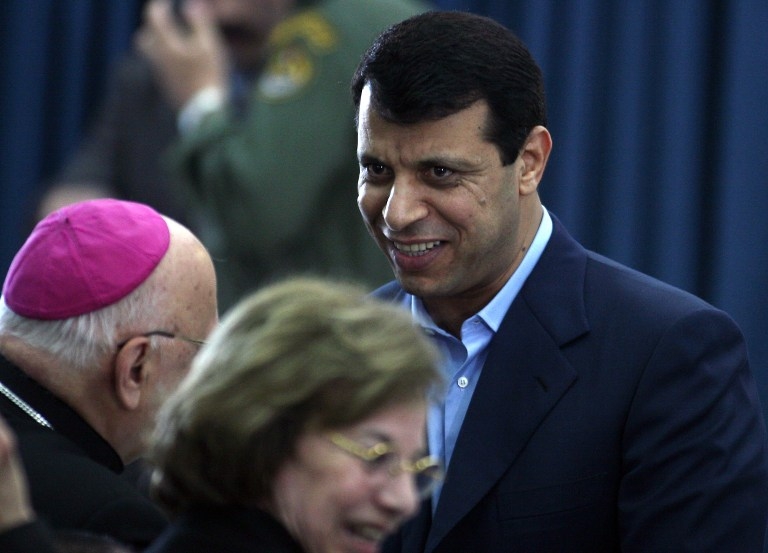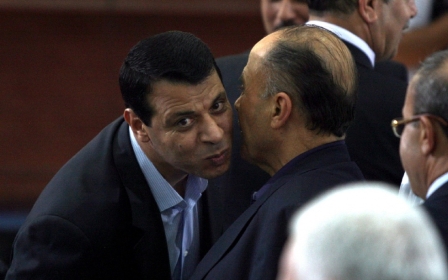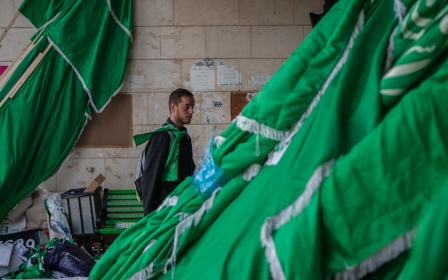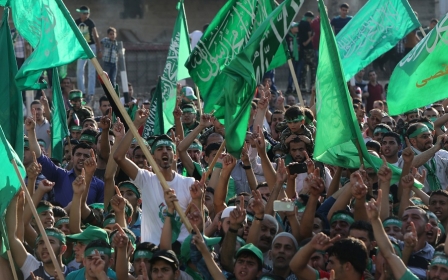Poised for a comeback, Palestine's Dahlan has ‘power, not popularity’

When a Ramallah court cleared Palestinian politician Mohammed Dahlan of corruption charges in April this year, Sevag Torossian, one among Dahlan’s legal team, hailed the court’s decision as a “great victory for the political future of Palestine”.
Torossian’s prophetic response to the court’s decision is one in a series of indicators that the former Fatah strongman - expelled from the party and exiled in UAE since 2011 - is positioning himself for a comeback to Palestine’s political stage.
Dr Sufian Abu Zaida, a colleague and confidant of Dahlan “has no doubt” that Dahlan is poised for a return to Ramallah. He says that Dahlan exhibits the “charisma” to play a lead role in Palestinian politics. Abu Zaida points to the relationships Dahlan is fostering with the UAE and Egypt in his exile as evidence of his political strength, and the real threat he poses to Palestine’s current leadership, especially President Abbas.
“Sisi loves him. Mohammed bin Zayed loves him. They both trust him. They are supporting him, even in his battle with Abbas. He has the money of the Emirates and the power of Egypt. What more does he need?”
Both Abu Zaida and Dr Ghassan Khatib, vice president of Birzeit University and retired politician, agree that Dahlan has won formidable political clout from the relationships he has developed with Egypt, UAE and even Hamas. “Nobody can tell you that Dahlan doesn’t have power,” says Abu Zaida. However, while Dr Khatib agrees that Dahlan has become a significant player in the region, he doesn’t believe Dahlan has the requisite popularity at home to match. “He has power, but not popularity... Where it counts, Dahlan has no popularity at all,” estimates Dr Khatib.
Continuity candidate
For ardent opponents of the current Palestinian Authority who would welcome a change in leadership, Dahlan is unpopular as a candidate to replace Abbas. He is seen not so much an alternative to the Abbas presidency, but rather as a disappointing continuation of it.
“The way I see it,” says Dr Sattar Kassem, a professor of political science at An-Najah University Nablus, who also ran in Palestine’s last presidential elections as an independent candidate, “There is no difference between Abu Mazen and Mohammad Dahlan. If Dahlan takes over Fatah, he will fight with Hamas and coordinate with the Israelis.”
Dr Kassem’s assessment is shared by Grant Rumley, a Palestinian political analyst based in Washington, who estimates Dahlan would “keep things quiet”. For Palestinians hoping that new leadership might come with a new political trajectory, Dahlan offers little hope. “He’s going to coordinate with the Israelis,” suggests Rumley, “he’s going to coordinate with the Americans,” adding, “with all the other headaches in the Middle East, the US likely just wants this one to stay quiet, which is why someone like Dahlan might be appealing”.
Dahlan’s political programme and how he may differ from the PA’s current leadership or even other candidate is limited to the pursuit of unilateral moves on the international stage suggests Dr Khatib in Birzeit.
“All the kind of candidates we have are of the same school of thought,” says Khatib, “The path is already set for them, and the borders are made clear by Israel. The only room for maneouvring for the incumbent presidents is the same as what is made available for the current leadership, which is playing in the international arena.”
Although Abu Zaida asserts that Dahlan has backing within the PA, Dr Khatib estimates that Dahlan would have difficulty winning a broad base of support within the PA requisite for a top position. “Whoever is going to run the country needs to be from Fatah, or needs to be acceptable for Fatah, he said, adding, “but Dahlan has a big problem with Fatah, especially in the West Bank”.
Dahlan’s political past is haunted by embarrassments, which routinely resurface. He was ousted as Fatah’s security chief in Gaza when rivals Hamas overthrew Fatah in the coastal strip in 2007. In 2011, he was expelled from the party on corruption charges, after having been accused of conspiring a coup against President Abbas.
Within the PA, vehement opposition to Dahlan is rarely far from the surface. Spokesperson for Palestine Security Services Major General Adnan Damiri, for instance, told MEE he sees Dahlan as “having failed politically in Palestine,” while Governor of Nablus Akram Rajoub counted an ability to retreat among Dahlan’s political strengths.
“Dahlan is good at running; he is good at hiding. First he ran from Gaza and then he ran from the West Bank. In the past he attacked Arafat; now he attacks Abu Mazen. Is he a viable alternative for the Palestinian Authority? No.”
Power without popularity
Among the public too, there is minimal support for Dahlan says Dr Khatib, who also conducts polls in his role with the Jerusalem Media and Communications Centre. He describes Dahlan as “so unpopular among Palestinians, activists, within Fatah and outside Fatah”.
“In the polls we see some popularity for Dahlan in Gaza. But Gaza is out of the equation because Gaza is under Hamas. So his strength in Gaza doesn’t help him very much in the West Bank. Where it counts, Dahlan has no popularity at all. In polls he shows as having a fraction of a percent. He has power, but not popularity.”
In March 2014, following President Abbas’ corruption charges against Dahlan, a Palestine Centre for Policy and Survey Research (PCPSR) poll showed that a mere seven percent believed Dahlan was innocent of the charges brought against him, even though he would be later cleared. A Jerusalem Media and Communications Centre poll reflects the same outcome.
Three months later, PCPSR’s polling on how the public would view the possible appointment of a deputy to President Abbas showed he was among the least favoured candidates with Dahlan trailing behind Marwan Barghouti, Rami al Hamdallah, Saeb Erikat, and tied with Mustafa Barghouti.
Danger of vacuum
Dahlan’s supporters in the West Bank approached by Middle East Eye refused to speak on the record about why they believe the exiled Gazan is best suited to take over as leader, despite the assurance of anonymity, fearing repercussions from Palestinian Authority security forces.
“The authority, the leadership, has been so tough against Dahlan and against anyone associated with Dahlan, it’s scary to be associated with. That’s why you’ll see people hiding this.” Abu Zaida told MEE that his car was shot 20 times after he publicly criticised President Abbas’ treatment of Dahlan.
As Dr Khatib says, “There have been numerous cases where suspicion of links to Dahlan was very costly to some people. Association with Dahlan can be harmful.” In Washington, Rumely says this threat extends to active members of the Palestinian Authority, where, openly supporting Dahlan could cost officials their jobs, concluding, “Dahlan’s support is hard to qualify and quantify: you don’t know how many guys he’s got or how far they’re willing to go for him.”
“The real question that needs to be asked is what will happen after [Abbas’] absence,” says Khatib. “That’s a serious question and I think the Palestinians should be busy thinking or preparing for that period. Because there is no preparation for that so far. There are no deputies, there is no system of succession, there are no arrangements - except that individuals are preparing factions of power in order to fight in that moment, which is very dangerous.”
Middle East Eye propose une couverture et une analyse indépendantes et incomparables du Moyen-Orient, de l’Afrique du Nord et d’autres régions du monde. Pour en savoir plus sur la reprise de ce contenu et les frais qui s’appliquent, veuillez remplir ce formulaire [en anglais]. Pour en savoir plus sur MEE, cliquez ici [en anglais].




